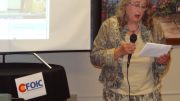By Jeffrey A. Roberts
CFOIC Executive Director
Buried in Tuesday’s Colorado election results was a measure approved by Littleton residents that severely restricts the City Council’s ability to discuss public business in private.
The city charter amendment, approved by 74 percent of voters, permits the council and all other city boards and commissions to call closed-door meetings (executive sessions) for only two reasons: 1) to discuss matters that must be kept confidential because of state and federal laws and 2) to seek legal advice from a city attorney on court actions that already have been filed. All executive sessions must be recorded in their entirety, and the recordings must be kept on file in the city clerk’s office until council members present at the meeting are no longer in office.
Littleton’s executive-session rules will now be much more restrictive than the Colorado Open Meetings Law, also known as the Sunshine Law, and more limiting than executive-session rules in most other home-rule cities in Colorado. An exception is Boulder, whose city charter does not allow executive sessions for any reason.
“I was on the school board in Littleton in the ’90s and I know what the Sunshine Law requires,” said Carol Brzeczek, one of the residents behind Initiative 301. “My husband started to attend City Council meetings, and they were just so blatant with their violations.”
Brzeczek, a member of a Littleton group called Citizens for Rational Development, said she has alleged multiple open-meeting violations since 2005. These include: rubber-stamping decisions previously made in executive sessions, failing to record votes taken during study sessions, making motions to go into executive session without citing the appropriate section of the law, settling lawsuits against the city without ever taking a public vote and deciding personnel matters behind closed doors without giving the subject of the executive session an opportunity to have the meeting conducted in public.
Brzeczek said City Council members sometimes adjusted their practices based on her complaints, but “I finally got tired of trying to get them to understand…So we made it very easy for them to understand the portion of the law about executive meetings.”
Colorado’s Sunshine Law requires the recording of local-government executive sessions, but the recorder may be turned off when council members get “privileged” legal advice from their attorneys. Under Littleton’s new charter provision, the council will not be allowed to turn off the recorder during an executive session. The state’s Sunshine Law lets local elected officials meet privately with attorneys to discuss specific legal questions, even if there is not a pending or imminent court action, but in Littleton such closed-door discussions with counsel will now have to concern legal matters already on file in a court. Administrative and non-litigation matters must be discussed in meetings open to the public.
Colorado’s open-meetings law permits executive sessions on certain topics that no longer can be discussed privately by the Littleton council, including collective-bargaining strategies, security arrangements and the purchase or sale of public property.
Geoff Wilson, general counsel for the Colorado Municipal League, said he worries the new restrictions will put Littleton taxpayers at a disadvantage, especially when property transactions must be discussed in public. “If you have to discuss your negotiating position with the seller’s attorney in the audience, the taxpayers are going to end up paying a lot more for that property,” he contended.
Although some local-government bodies have abused executive-session privileges, Wilson said there are sound reasons for keeping certain discussions private.
“The law wasn’t written to protect elected officials,” he said. “It was written to enable local officials to preserve the public interest. That’s often misunderstood. This isn’t a device for dodging political accountability, and when it’s used in that way, it’s an abuse of the system.”
Follow the Colorado Freedom of Information Coalition on Twitter @CoFOIC. Like CFOIC’s Facebook page. Do you appreciate the information and resources provided by CFOIC? Please consider making a tax-deductible donation.




